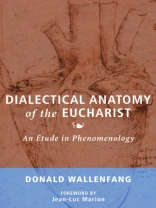For centuries, Christian theology has understood the Eucharist in terms of metaphysics or in protest against it. Today an opening has been made to imagine the sacrament through the method of phenomenology, bringing about new theological life and meaning. In Dialectical Anatomy of the Eucharist, Donald Wallenfang conducts a sustained analysis of the Eucharist through the aperture of phenomenology, yet concludes the study with poetic and metaphysical twists. Engaging the work of Jean-Luc Marion, Paul Ricoeur, and Emmanuel Levinas, Wallenfang proposes pioneering ideas for contemporary sacramental theology that have vast implications for interfaith and interreligious dialogue. By tapping into the various currents within the Judeo-Christian tradition–Jewish, Catholic, Orthodox, and Protestant–a radical argument is developed that leverages the tension among them all. Several new frontiers are explored: dialectical theology, a fourth phenomenological reduction, the phenomenology of human personhood, the poetics of the Eucharist, and a reinterpretation of the concept of gift as conversation. On the whole, Wallenfang advances recent debates surrounding the relationship between phenomenology and theology by claiming an uncanny way out of emerging dead ends in philosophical theology: return to the fray.
Om författaren
Donald Wallenfang, OCDS, Emmanuel Mary of the Cross, is Professor of Theology and Philosophy at Sacred Heart Major Seminary in Detroit. He is the author and editor of several books, including Shoeless: Carmelite Spirituality in a Disquieted World (Wipf & Stock, 2021), Phenomenology: A Basic Introduction in the Light of Jesus Christ (Cascade, 2019), Metaphysics: A Basic Introduction in a Christian Key (Cascade, 2019), Human and Divine Being: A Study on the Theological Anthropology of Edith Stein (Cascade, 2017), and Dialectical Anatomy of the Eucharist: An Étude in Phenomenology (Cascade, 2017).







![Omslag till Brian Schrag & Julisa Rowe: Community Arts for God's Purposes [Chinese] 貼近神心意的社群藝術 Omslag till Brian Schrag & Julisa Rowe: Community Arts for God's Purposes [Chinese] 貼近神心意的社群藝術](https://static.worldofdigitals.com/thumb_webp/740/9781645083740.webp)




